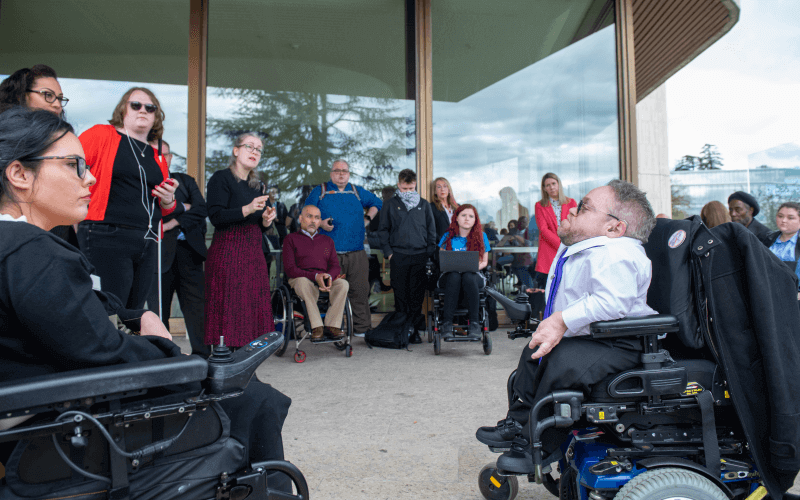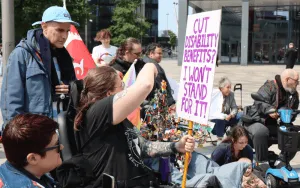Disabled people’s organisations from across the UK have described the government’s evidence to a UN disability rights committee this week as “an insult to disabled people” and full of “half-truths, untruths” and “empty assertions”.
Representatives from more than 10 disabled people’s organisations (DPOs) were in Geneva (pictured) to witness the evidence given by the UK government as it attempted to persuade the committee it had made progress since being found guilty of “grave and systematic violations” of the UN Convention on the Rights of Persons with Disabilities in 2016.
But they have told Disability News Service (DNS) that the evidence provided by a delegation of civil servants from the Disability Unit, the Department for Work and Pensions and the Department of Health and Social Care failed to address key concerns raised more than seven years ago by the UN committee on the rights of disabled people.
In an initial statement on Monday afternoon, Alexandra Gowlland, deputy director of the Disability Unit, pointed to a string of recent government policies across disability strategy, social security, housing, social care and employment, nearly all of which have been widely discredited (see separate story).
She and fellow civil servants were also asked to respond to concerns and questions raised by members of the committee.
But representatives of the DPOs that had travelled to Geneva to brief the committee and watch the session say they were appalled at the evidence given by the UK government’s delegation.
Ellen Clifford, who coordinates the coalition of DPOs that monitors the implementation of the convention in the UK, told DNS that the UK government’s representatives had “avoided all of the substantive issues with which the special inquiry is concerned, and failed to answer any of the committee’s questions.
“They chose instead to talk out their time on issues irrelevant to the inquiry and in a misleadingly positive light.
“We felt their approach was disrespectful to the committee and showed how little they value the lives of Deaf and disabled people.”
She said the questions and comments from the UN rapporteurs – the committee members who have led investigations into the UK’s progress – “showed how well they understand the true picture of what is happening and that they had really listened to and valued the evidence we submitted and the testimonies that were shared with them by Deaf and disabled people”.
John McArdle, co-founder of the Scottish-based grassroots group Black Triangle, said the failure of the UK delegation to address the issues raised by the committee was “insulting, not only to us, but to the United Nations, the rapporteurs and the institution itself”.
He told DNS that the UK government was guilty of “whitewashing and ignoring the rock-solid evidence” and that its delegation had kept trying to “dodge the bullets” by not addressing the issues raised by committee members.
He said Gowlland had failed to respond to the significant criticisms of the work capability assessment by the committee and “how dangerous the system is, how it has cost so, so many lives”.
He said: “If they’re not addressing these issues, then they’re completely evading their responsibilities under the convention.”
Svetlana Kotova, director of campaigns and justice at Inclusion London, told DNS: “The government’s response laid bare the fact that they have done nothing to progress our rights to independent living, employment or an adequate standard of living.
“Their update was a list of empty promises or laws that don’t give people any rights; and we know they are pushing reforms which will lead to further retrogression.
“We hope the UN disability committee will see beyond this and hold them to account.”
Kamran Mallick, chief executive of Disability Rights UK, said on Monday: “Although we are not surprised by the UK government’s response today, we still feel that their refusal to properly engage with this process is an insult to all disabled people whose experiences are reflected in the evidence we’ve provided to the UN.
“Despite requesting a delay last year, they have provided us with no new evidence – instead signposting to plans and policies that create no transformative change.
“The delegation shared all the ways they believe they’ve created progress for disabled people’s rights – but they know, just as we do, that no progress has been made.
“In fact, we have gone backwards.”
Natasha Hirst, president of the National Union of Journalists and the disability representative on its national executive, said the UK government’s delegation had “not stood up well to the scrutiny of the committee”.
She said: “Their empty assertions of being committed to improving disabled people’s lives are in clear contrast with the daily reality of poverty, exclusion and a frequently punitive social security system.
“Planned reforms and continued negative rhetoric about disabled people will only make things worse.”
Rhian Davies, chief executive of Disability Wales, also said the UK government’s evidence was “far removed from the reality of disabled people’s lives and experiences since 2016”.
She said: “We are not shocked, but appalled, by the lack of acknowledgement concerning the deaths of disabled people awaiting assessment decisions, the criticism of DDPOs* regarding recent policy such as the health and disability white paper or the harm caused by the disablist ‘benefit scroungers’ stereotyping promoted by the UK government.”
Mark Harrison, a member of the steering group of the Reclaiming Our Futures Alliance, said: “The UNCRPD committee is not fooled by the half-truths, untruths and smokescreen presented by representatives of the British government.
“They know the Tories are completely hostile to human rights and equality for disabled people.
“The UK delegation has presented the realities of human rights violations that demonstrate ongoing and deepening grave and systematic attacks on living standards and deaths from benefit and cuts to community support services.”
Tony O’Reilly, from Northern Ireland’s Northwest Forum of People with Disabilities, said: “Over these last months we gave our evidence to the… committee supported by facts and the strong testimony of Deaf and disabled people.
“All of us together sought to shine a light on the truth of our perilous situation.
“The fact that the UK government and the devolved administrations sought to hide in the dark refusing to answer directly the questions of this esteemed committee is shameful and another barrier to the full realisation of our human rights as Deaf and disabled people.”
Clifford, a member of the national steering committee of Disabled People Against Cuts, also highlighted the “size and strength” of the delegation of DPOs to Geneva, which was boosted for the first time by disabled trade unionists, and she pointed to the “hard work and support from those back in the UK”.
She said this “gave us confidence that when we come home we can build a strong resistance movement to oppose further cuts to social security and to demand a right to adequate support to live and be fully included in the community”.
Kotova also praised the “solidarity among disabled people and DPOs across UK nations”.
She said: “If anything, this process can help us build on this as a movement as we will have to keep on fighting.”
*Deaf and disabled people’s organisations
Picture by Natasha Hirst
A note from the editor:
Please consider making a voluntary financial contribution to support the work of DNS and allow it to continue producing independent, carefully-researched news stories that focus on the lives and rights of disabled people and their user-led organisations.
Please do not contribute if you cannot afford to do so, and please note that DNS is not a charity. It is run and owned by disabled journalist John Pring and has been from its launch in April 2009.
Thank you for anything you can do to support the work of DNS…

 This bill opens the door to scandal, abuse and injustice, disabled activists say after assisted dying bill vote
This bill opens the door to scandal, abuse and injustice, disabled activists say after assisted dying bill vote ‘We will not give a single inch,’ disabled activists vow, as Kendall publishes disability cuts bill
‘We will not give a single inch,’ disabled activists vow, as Kendall publishes disability cuts bill Activists consider legal action after DWP cancels only face-to-face benefit cuts consultation event in Wales
Activists consider legal action after DWP cancels only face-to-face benefit cuts consultation event in Wales